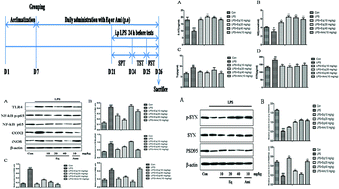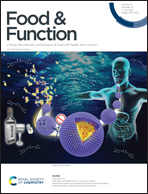S-equol, a metabolite of dietary soy isoflavones, alleviates lipopolysaccharide-induced depressive-like behavior in mice by inhibiting neuroinflammation and enhancing synaptic plasticity
Abstract
Systemic injection with lipopolysaccharide can lead to depressive-like behavior in experimental animals by inducing neuroinflammation and is considered to be a classic model of depression. S-equol is a major metabolite of dietary soy isoflavones with antioxidant and anti-inflammatory effects, and it has many beneficial effects on human health, including alleviation of menopausal symptoms, osteoporosis, cancer, obesity, chronic kidney disease, and cognitive dysfunction. A recent study reported that S-equol inhibited lipopolysaccharide-stimulated neuroinflammation in astrocytes. However, there is no research on the antidepressant-like effects of S-equol. Therefore, the present study was conducted to evaluate the antidepressant-like effects of S-equol in a lipopolysaccharide-induced depression model in mice and explore its underlying mechanisms. Our results demonstrated that treatment with S-equol (10, 20 and 40 mg kg−1) for 19 days markedly reversed the behavior of acute LPS (1.0 mg kg−1) treated mice in sucrose preference, tail suspension and forced swimming tests, exerting antidepressant-like effects. In addition, S-equol administration significantly decreased the levels of pro-inflammatory cytokines (tumor necrosis factor, interleukin-6, interleukin-10, interleukin-1β), increased the levels of 5-hydroxytryptamine and norepinephrine, and normalized the release of tryptophan and kynurenine in the hippocampi of lipopolysaccharide-treated mice. Moreover, treatment with S-equol significantly up-regulated the expression of synaptic plasticity-related proteins (phospho synapsin, synapsin, postsynaptic density-95) and down-regulated the toll-like receptor 4/nuclear factor kappa B signaling pathway in the hippocampi of lipopolysaccharide-treated mice. These findings demonstrated that S-equol significantly alleviated the depressive-like behavior induced by acute systemic injection of LPS, and its antidepressant action was related to mediation of neuroinflammation via the TLR4/NF-κB signaling pathway, normalization of the monoamine neurotransmitter levels, reversal of tryptophan metabolism dysfunction, and enhancement of synaptic plasticity. The current study provides insight into the potential of S-equol in the prevention of depression.



 Please wait while we load your content...
Please wait while we load your content...